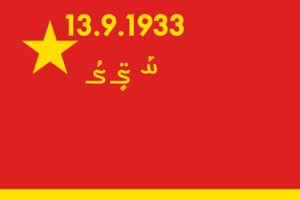Red Liberation Army (RLA)
| Red Liberation Army (RLA) | |
|---|---|
 | |
| Service branches | |
| Leadership | |
| Generalissimo | Gadzi Pyao-ma |
| Minister of National Defense | Chai Lat-sü |
| Personnel | |
| Military age | 18 |
| Conscription | Yes (male & limited female) |
| Available for military service | 46,070,800 (est.), age 18-45 |
| Fit for military service | 38,666,600 (est.), age 18-45 |
| Active personnel | 493,600 |
| Reserve personnel | 2,550,300 |
| Deployed personnel | None |
| Expenditure | |
| Budget | $90.48B |
| Percent of GDP | 8.7% |
| Industry | |
| Annual imports | Union-Siberian Socialist-Monarchy |
| Annual exports | United Valleys, Buyo, Scorpia |
The Red Liberation Army acts as the official military of Posadastan.
History
Conscription
The practice of conscription began in 1890 to build up a stronger, more capable military. It carried on until the fall of the Monarchy in 1929 and the fall of the Republic in 1933. Under the early communist government it was written in law but was not enforced until 1940 after the death of Chairman Lenin. The Federation of Communes banned conscription in 1942 after its ascension to power, but it was brought back by the Posadists in 1975.
Since 1975, all Amonian males were required to do 2 years of military service starting at the age of 18. Between 1988 and 1994, Generalissimo Hao began integrating indigenous groups into the draft, and in 2010 Amonian women were included. Women were only required to do 18 months, but could opt (alongside select males, typically those deemed “unfit for service”) to take part in numerous 2 year “national service” programs.
National Service programs include working in schools, special education, administration, hospitals, law, geriatrics, nursing homes, health clinics, teens at risk, internal security (policing, PRG membership, ISB training, etc.), disadvantaged communities, conservation bureau, immigrant assistance, youth organizations, and others.
After completing the conscription period, all former conscripts are automatically enrolled for reserve duty until the age of 45 (for males) or 40 (for females). That is, unless they become exempted during that period.
There are also various forms of deferment: - Volunteering for a 1-year service in a youth organization. - Graduating high school - Postponement due to extenuating personal circumstances
It is also possible for some conscripts to complete higher education while carrying out their military service. It is called the “Essential Academic Program." This program is reserved for conscripts who have “exhibited outstanding academic performance” and “leadership potential” in fields that are applicable to “advancing the future of Posadastan.” Such programs include all STEM majors (insofar as it applies to military research and development, or essential economic activity), and select courses run by the ISB on psychology, technology, and security services (only for select individuals), or advanced medical research and education like surgeons and doctors.
There is also an academic reserve for those individuals who want to pursue higher education in fields not applicable to the above “prior to military service. If allowed, they may be allotted 1 to 4 years to pursue a degree in whatever field they desire before being drafted. This does of course come with academic stipulations such as maintaining a minimum GPA of 2.5 and holding an approved job throughout the allotted period. This academic reserve is mostly for those pursuing nursing, economics, law, and other “non-immediately essential degrees,” but some flexibility is applied.
Branches
The RLA is composed of the 5 following branches:
RLA Ground Forces
Focuses mostly on land-based warfare, made up of 253,000 active personnel. They maintain a capable force of well-trained active duty and reserve soldiers. In recent years they've mostly operated abroad in humanitarian roles, but do help to train members of the People's Revolutionary Guard who do actively participate in conflicts abroad.
Covers all maritime affairs, mostly combatting maritime piracy and carrying out reconnaissance via its relatively large and well-capable submarine fleet. They also work alongside the air force to patrol the skies around Posadastan. They have recently run into conflict with the Rocket Forces over the control of ballistic missile submarines. The navy is also over the Posadi Marine Mammal Program, which has been jokingly nicknamed the "Cetacean Liberation Army." They currently have 48,000 active duty.
RLA Air Force
Considered the least-developed branch of the RLA, the focus more on reconnaissance, ground support, logistics, intercepting, and counter-insurgency measures. In recent years, the Posadi Defense Industries have developed various new helicopters and unmanned aerial vehicles for the air force. There are 21,000 active duty.
RLA Rocket Forces
This branch is in control of the nation's missiles, with the exception of those 5 ballistic missile submarines belonging to the Navy. They currently maintain a force of approximately 1500 ballistic missiles, with the furthest known range available being an estimated 1400-2000km (870-1240mi). They also control the Kharoi missile factories. 24,000 active duty personnel.
RLA Strategic Support Force
Inducted in 2011, this branch is still considered subservient to the Rocket Forces. The Strategic Support Force focuses mostly on space and monitoring enemy satellites. The first Posadastan-based satellite launch was carried out in 2017, with another 14 launched since. Has 11,000 active duty personnel.